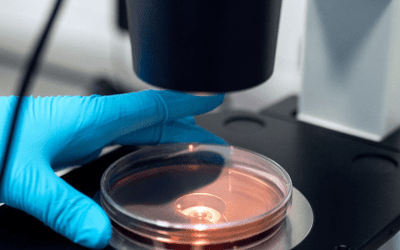Artificial intelligence is revolutionising the pharmaceutical industry and the way laboratories and their people operate. In particular, AI is having a growing impact on drug discovery and development, helping labs to divert away from traditional, often time-consuming, costly and potentially problematic traditional processes.
Leveraging advanced computational techniques and technology, to analyse data, predict outcomes and optimise clinical trials, the integration of artificial intelligence requires a transformative approach. However, it is one that has the power and potential to accelerate drug discovery and development and therefore help us to treat illness and disease more effectively and efficiently.
Here are a few important ways AI is reshaping this critical field.
Accelerating Drug Screening and Design
AI algorithms, especially those based on machine learning and deep learning, can analyse vast datasets to identify potential drug candidates. High-throughput screening, which traditionally required significant time and resources, can now be performed more efficiently. AI models can predict the properties of new compounds, optimise their structures, and even design novel molecules with desired biological activities.
AI-driven drug design often involves techniques such as virtual screening and de novo design. Virtual screening uses AI to sift through large libraries of chemical compounds, identifying those most likely to bind to a target protein. De novo design, on the other hand, involves creating new molecules from scratch, tailored to fit specific biological targets.
Enhancing Predictive Modelling
Predictive modelling is crucial in assessing the efficacy and safety of drug candidates. AI can analyse complex biological and chemical data to forecast how a drug will interact with the human body. Such predictions can be vital for identifying potential side effects and interactions, which can reduce the risk of failures later in the drug development journey, and of course ensure the safety of candidates.
AI models use multiomics data (genomic, proteomic, metabolomic) to understand the intricate biological pathways involved in disease. By integrating this data, AI can predict how a drug will affect these pathways, providing insights into its therapeutic potential and safety profile. Additionally, AI can simulate clinical trials using synthetic control arms and digital twins, which mimic real-world patient data to predict trial outcomes without the need for extensive human testing.
Streamlining Clinical Trials
Clinical trials are a critical phase in drug development. However, such trials can be challenged by high costs and lengthy durations. Artificial intelligence can streamline this process by identifying suitable participants, predicting trial outcomes, and monitoring patient responses in real-time. This not only accelerates the trial process but also enhances the accuracy and reliability of the results.
AI can analyse electronic health records to identify patients who meet specific criteria for a trial, ensuring a more targeted and efficient recruitment process. During trials, real-time data monitoring, the detection of adverse reactions and adjusting protocols as needed can help to optimise trial design, using adaptive strategies to modify the trial based on interim results, thus improving the chances of success.
Advancing Personalised Medicine
One of the most promising applications of AI in drug development is personalised medicine. By analysing individual patient data, including genetic information, lifestyle, and medical history, Artificial Intelligence can help develop tailored treatment plans. This ensures that patients receive the most effective therapies based on their unique profiles, improving treatment outcomes and reducing adverse effects.
AI-driven personalised medicine involves precision targeting of therapies based on genetic markers. For example, artificial intelligence can identify specific mutations in cancer cells that can be targeted by new drugs, leading to more effective treatments with fewer side effects. Additionally, AI can predict how different patients will respond to a drug, allowing for the customisation of dosages and treatment timetables.
Integrating and Analysing Diverse Data
Artificial intelligence excels at integrating and analysing diverse datasets from various sources, such as genomic data, clinical records, and scientific literature. This comprehensive analysis provides deeper insights into disease mechanisms and identifies novel therapeutic targets. AI-driven data integration is paving the way for more informed and effective drug discovery.
AI uses network-based approaches to analyse data from multiple sources, identifying connections between genes, proteins, and metabolic pathways. This holistic view helps researchers understand the underlying mechanisms of diseases and identify key targets for intervention. It can also mine scientific literature to uncover previously overlooked insights, accelerating the discovery of new drug candidates.
Challenges and Future Directions
Despite its transformative potential, the implementation of AI in drug discovery and development is not without challenges. High-quality data is essential for training accurate AI models, and there are ethical considerations regarding data privacy and security. Additionally, there is potential for AI models to biased if trained on unrepresentative datasets, leading to less generalised results.
To fully realise the benefits of artificial intelligence, ongoing research and collaboration between AI experts and pharmaceutical scientists are crucial. According to findings from Synergy by SRG’s Lab Leader Vision Survey, the impact of technologies in laboratories is already being embraced, with many viewing AI, automation and robotics as important to the future of labs and their outputs.






